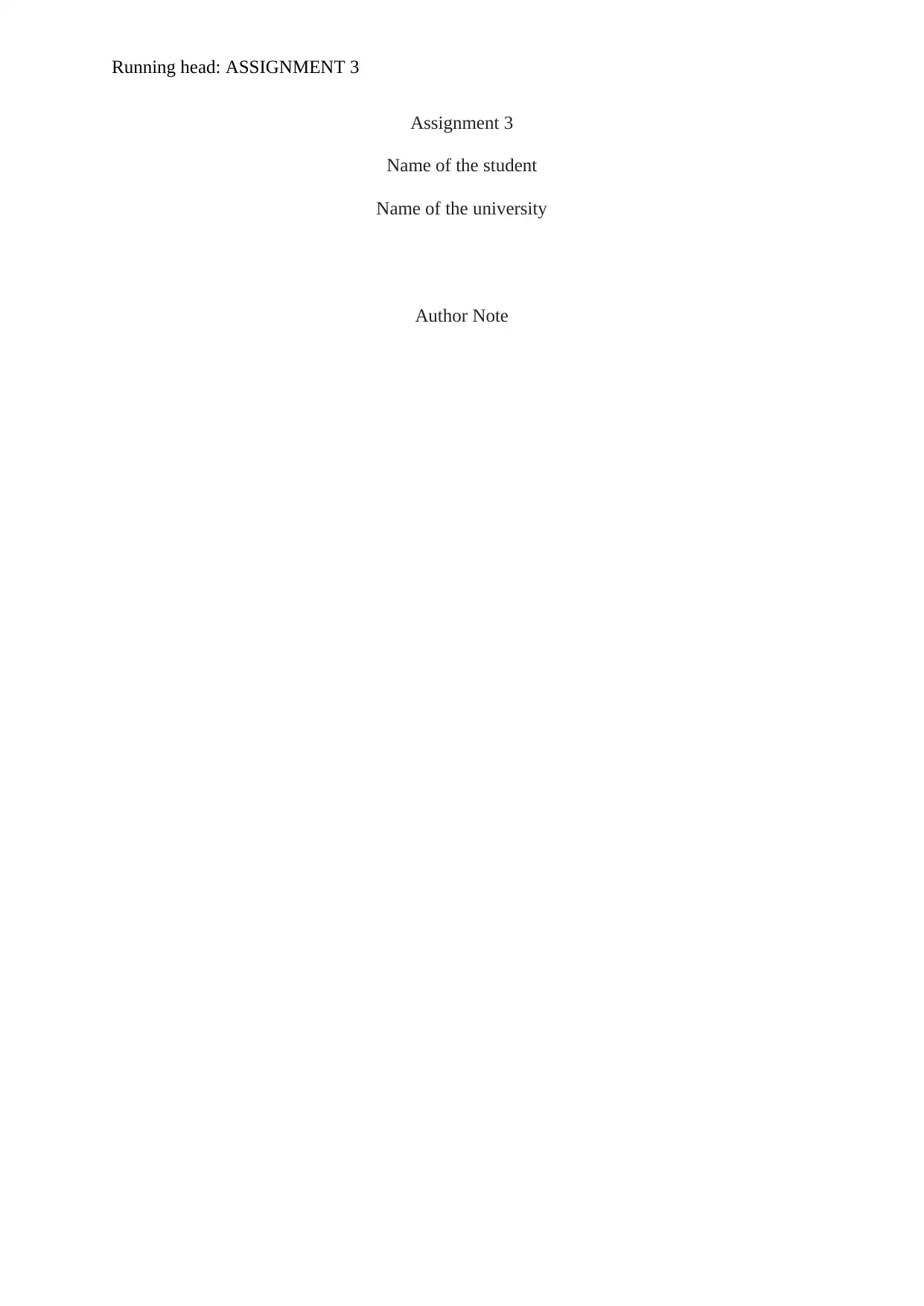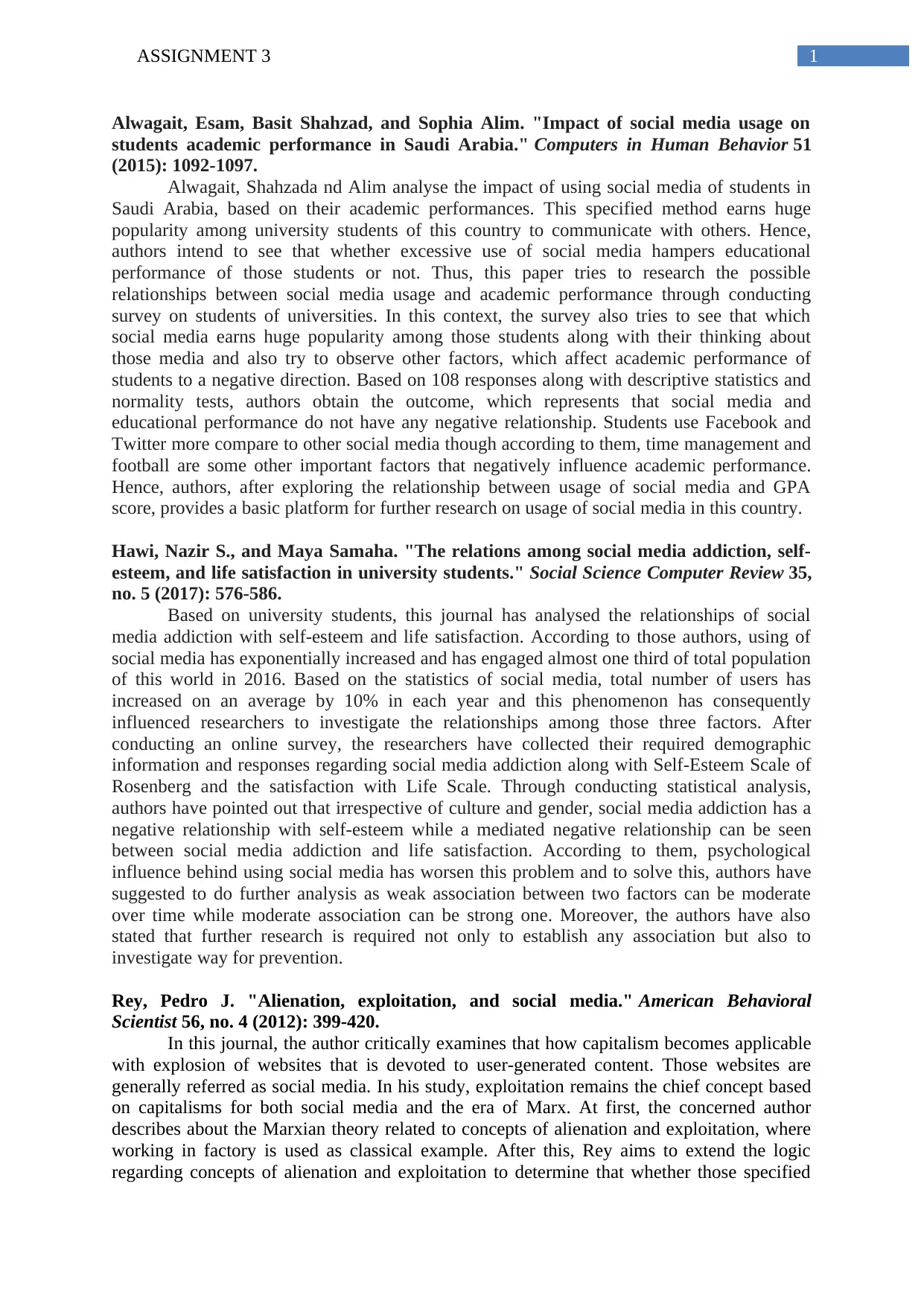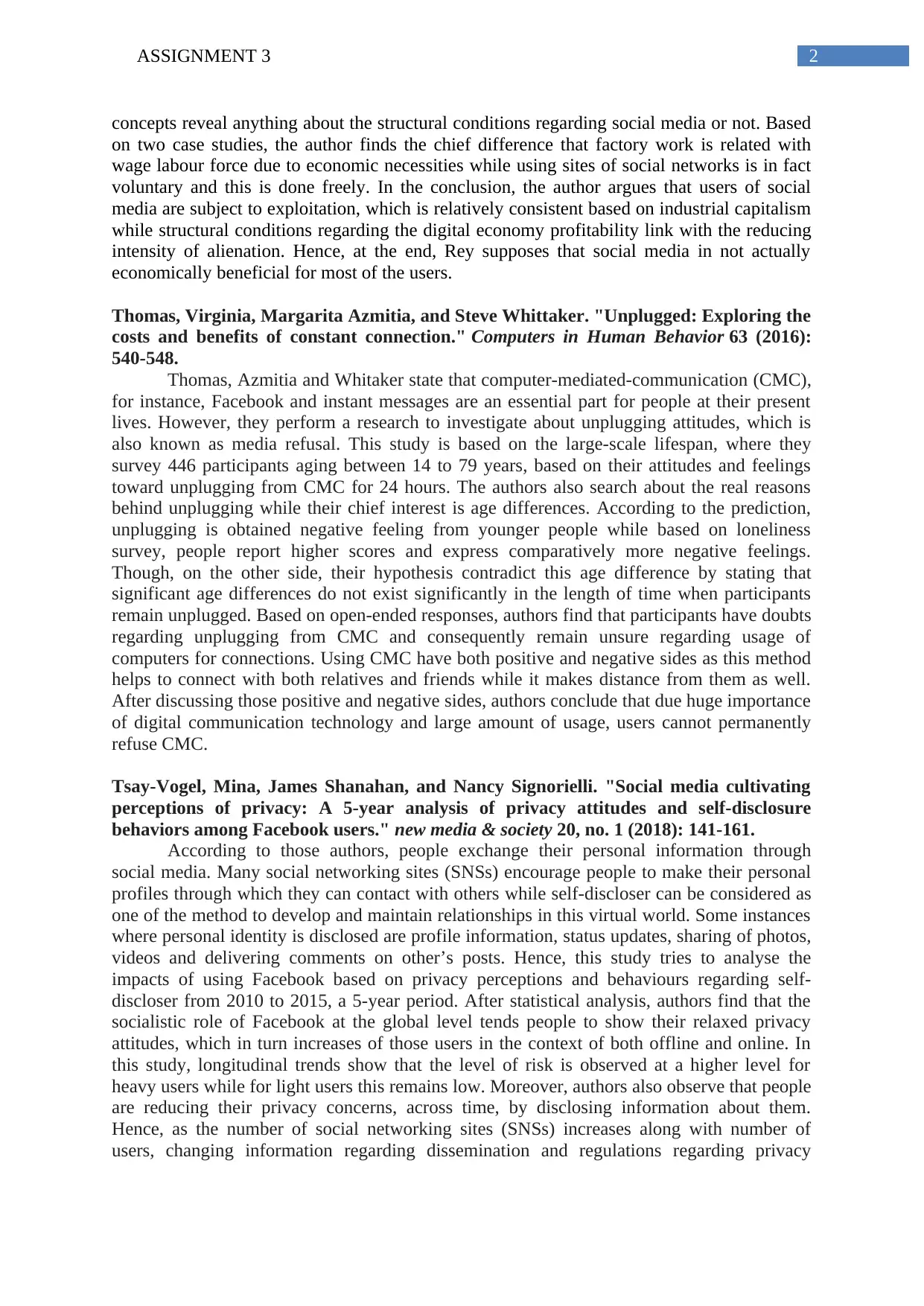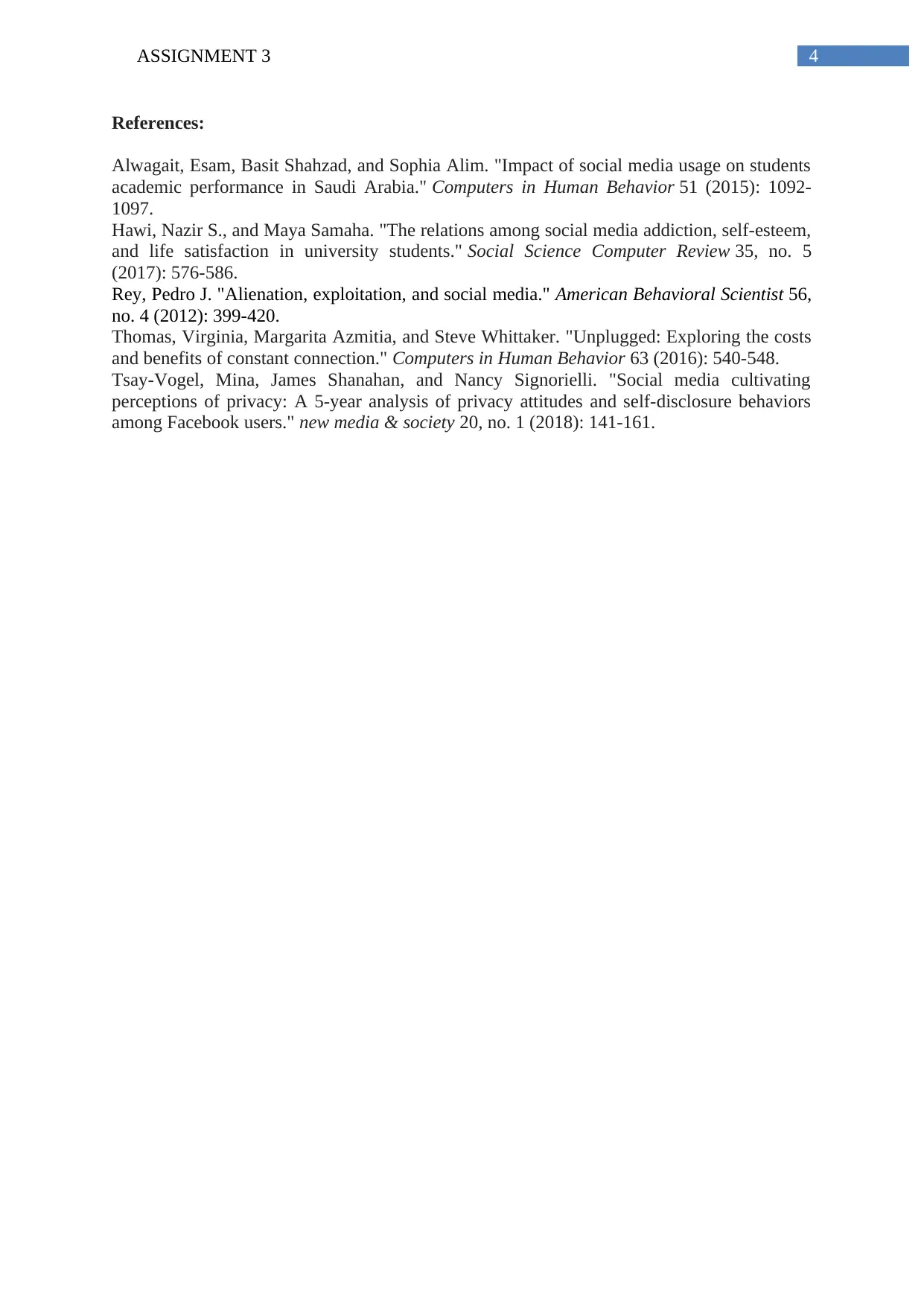Exploring the Impact of Social Media: A Detailed Literature Review
VerifiedAdded on 2021/06/16
|5
|1588
|42
Literature Review
AI Summary
This literature review synthesizes findings from five research articles examining the multifaceted impacts of social media. Alwagait, Shahzad, and Alim (2015) explore the relationship between social media usage and academic performance among Saudi Arabian university students, finding no negative correlation. Hawi and Samaha (2017) analyze the connections between social media addiction, self-esteem, and life satisfaction, revealing a negative relationship between addiction and self-esteem. Rey (2012) examines social media through a Marxist lens, discussing alienation and exploitation in the context of user-generated content. Thomas, Azmitia, and Whittaker (2016) investigate attitudes toward unplugging from computer-mediated communication, noting both positive and negative aspects. Finally, Tsay-Vogel, Shanahan, and Signorielli (2018) analyze the impact of Facebook usage on privacy perceptions and self-disclosure behaviors, finding that increased usage correlates with relaxed privacy attitudes. The review highlights the complex and evolving role of social media in contemporary society, touching on areas such as education, psychology, economics and personal identity.

Running head: ASSIGNMENT 3
Assignment 3
Name of the student
Name of the university
Author Note
Assignment 3
Name of the student
Name of the university
Author Note
Paraphrase This Document
Need a fresh take? Get an instant paraphrase of this document with our AI Paraphraser

1ASSIGNMENT 3
Alwagait, Esam, Basit Shahzad, and Sophia Alim. "Impact of social media usage on
students academic performance in Saudi Arabia." Computers in Human Behavior 51
(2015): 1092-1097.
Alwagait, Shahzada nd Alim analyse the impact of using social media of students in
Saudi Arabia, based on their academic performances. This specified method earns huge
popularity among university students of this country to communicate with others. Hence,
authors intend to see that whether excessive use of social media hampers educational
performance of those students or not. Thus, this paper tries to research the possible
relationships between social media usage and academic performance through conducting
survey on students of universities. In this context, the survey also tries to see that which
social media earns huge popularity among those students along with their thinking about
those media and also try to observe other factors, which affect academic performance of
students to a negative direction. Based on 108 responses along with descriptive statistics and
normality tests, authors obtain the outcome, which represents that social media and
educational performance do not have any negative relationship. Students use Facebook and
Twitter more compare to other social media though according to them, time management and
football are some other important factors that negatively influence academic performance.
Hence, authors, after exploring the relationship between usage of social media and GPA
score, provides a basic platform for further research on usage of social media in this country.
Hawi, Nazir S., and Maya Samaha. "The relations among social media addiction, self-
esteem, and life satisfaction in university students." Social Science Computer Review 35,
no. 5 (2017): 576-586.
Based on university students, this journal has analysed the relationships of social
media addiction with self-esteem and life satisfaction. According to those authors, using of
social media has exponentially increased and has engaged almost one third of total population
of this world in 2016. Based on the statistics of social media, total number of users has
increased on an average by 10% in each year and this phenomenon has consequently
influenced researchers to investigate the relationships among those three factors. After
conducting an online survey, the researchers have collected their required demographic
information and responses regarding social media addiction along with Self-Esteem Scale of
Rosenberg and the satisfaction with Life Scale. Through conducting statistical analysis,
authors have pointed out that irrespective of culture and gender, social media addiction has a
negative relationship with self-esteem while a mediated negative relationship can be seen
between social media addiction and life satisfaction. According to them, psychological
influence behind using social media has worsen this problem and to solve this, authors have
suggested to do further analysis as weak association between two factors can be moderate
over time while moderate association can be strong one. Moreover, the authors have also
stated that further research is required not only to establish any association but also to
investigate way for prevention.
Rey, Pedro J. "Alienation, exploitation, and social media." American Behavioral
Scientist 56, no. 4 (2012): 399-420.
In this journal, the author critically examines that how capitalism becomes applicable
with explosion of websites that is devoted to user-generated content. Those websites are
generally referred as social media. In his study, exploitation remains the chief concept based
on capitalisms for both social media and the era of Marx. At first, the concerned author
describes about the Marxian theory related to concepts of alienation and exploitation, where
working in factory is used as classical example. After this, Rey aims to extend the logic
regarding concepts of alienation and exploitation to determine that whether those specified
Alwagait, Esam, Basit Shahzad, and Sophia Alim. "Impact of social media usage on
students academic performance in Saudi Arabia." Computers in Human Behavior 51
(2015): 1092-1097.
Alwagait, Shahzada nd Alim analyse the impact of using social media of students in
Saudi Arabia, based on their academic performances. This specified method earns huge
popularity among university students of this country to communicate with others. Hence,
authors intend to see that whether excessive use of social media hampers educational
performance of those students or not. Thus, this paper tries to research the possible
relationships between social media usage and academic performance through conducting
survey on students of universities. In this context, the survey also tries to see that which
social media earns huge popularity among those students along with their thinking about
those media and also try to observe other factors, which affect academic performance of
students to a negative direction. Based on 108 responses along with descriptive statistics and
normality tests, authors obtain the outcome, which represents that social media and
educational performance do not have any negative relationship. Students use Facebook and
Twitter more compare to other social media though according to them, time management and
football are some other important factors that negatively influence academic performance.
Hence, authors, after exploring the relationship between usage of social media and GPA
score, provides a basic platform for further research on usage of social media in this country.
Hawi, Nazir S., and Maya Samaha. "The relations among social media addiction, self-
esteem, and life satisfaction in university students." Social Science Computer Review 35,
no. 5 (2017): 576-586.
Based on university students, this journal has analysed the relationships of social
media addiction with self-esteem and life satisfaction. According to those authors, using of
social media has exponentially increased and has engaged almost one third of total population
of this world in 2016. Based on the statistics of social media, total number of users has
increased on an average by 10% in each year and this phenomenon has consequently
influenced researchers to investigate the relationships among those three factors. After
conducting an online survey, the researchers have collected their required demographic
information and responses regarding social media addiction along with Self-Esteem Scale of
Rosenberg and the satisfaction with Life Scale. Through conducting statistical analysis,
authors have pointed out that irrespective of culture and gender, social media addiction has a
negative relationship with self-esteem while a mediated negative relationship can be seen
between social media addiction and life satisfaction. According to them, psychological
influence behind using social media has worsen this problem and to solve this, authors have
suggested to do further analysis as weak association between two factors can be moderate
over time while moderate association can be strong one. Moreover, the authors have also
stated that further research is required not only to establish any association but also to
investigate way for prevention.
Rey, Pedro J. "Alienation, exploitation, and social media." American Behavioral
Scientist 56, no. 4 (2012): 399-420.
In this journal, the author critically examines that how capitalism becomes applicable
with explosion of websites that is devoted to user-generated content. Those websites are
generally referred as social media. In his study, exploitation remains the chief concept based
on capitalisms for both social media and the era of Marx. At first, the concerned author
describes about the Marxian theory related to concepts of alienation and exploitation, where
working in factory is used as classical example. After this, Rey aims to extend the logic
regarding concepts of alienation and exploitation to determine that whether those specified

2ASSIGNMENT 3
concepts reveal anything about the structural conditions regarding social media or not. Based
on two case studies, the author finds the chief difference that factory work is related with
wage labour force due to economic necessities while using sites of social networks is in fact
voluntary and this is done freely. In the conclusion, the author argues that users of social
media are subject to exploitation, which is relatively consistent based on industrial capitalism
while structural conditions regarding the digital economy profitability link with the reducing
intensity of alienation. Hence, at the end, Rey supposes that social media in not actually
economically beneficial for most of the users.
Thomas, Virginia, Margarita Azmitia, and Steve Whittaker. "Unplugged: Exploring the
costs and benefits of constant connection." Computers in Human Behavior 63 (2016):
540-548.
Thomas, Azmitia and Whitaker state that computer-mediated-communication (CMC),
for instance, Facebook and instant messages are an essential part for people at their present
lives. However, they perform a research to investigate about unplugging attitudes, which is
also known as media refusal. This study is based on the large-scale lifespan, where they
survey 446 participants aging between 14 to 79 years, based on their attitudes and feelings
toward unplugging from CMC for 24 hours. The authors also search about the real reasons
behind unplugging while their chief interest is age differences. According to the prediction,
unplugging is obtained negative feeling from younger people while based on loneliness
survey, people report higher scores and express comparatively more negative feelings.
Though, on the other side, their hypothesis contradict this age difference by stating that
significant age differences do not exist significantly in the length of time when participants
remain unplugged. Based on open-ended responses, authors find that participants have doubts
regarding unplugging from CMC and consequently remain unsure regarding usage of
computers for connections. Using CMC have both positive and negative sides as this method
helps to connect with both relatives and friends while it makes distance from them as well.
After discussing those positive and negative sides, authors conclude that due huge importance
of digital communication technology and large amount of usage, users cannot permanently
refuse CMC.
Tsay-Vogel, Mina, James Shanahan, and Nancy Signorielli. "Social media cultivating
perceptions of privacy: A 5-year analysis of privacy attitudes and self-disclosure
behaviors among Facebook users." new media & society 20, no. 1 (2018): 141-161.
According to those authors, people exchange their personal information through
social media. Many social networking sites (SNSs) encourage people to make their personal
profiles through which they can contact with others while self-discloser can be considered as
one of the method to develop and maintain relationships in this virtual world. Some instances
where personal identity is disclosed are profile information, status updates, sharing of photos,
videos and delivering comments on other’s posts. Hence, this study tries to analyse the
impacts of using Facebook based on privacy perceptions and behaviours regarding self-
discloser from 2010 to 2015, a 5-year period. After statistical analysis, authors find that the
socialistic role of Facebook at the global level tends people to show their relaxed privacy
attitudes, which in turn increases of those users in the context of both offline and online. In
this study, longitudinal trends show that the level of risk is observed at a higher level for
heavy users while for light users this remains low. Moreover, authors also observe that people
are reducing their privacy concerns, across time, by disclosing information about them.
Hence, as the number of social networking sites (SNSs) increases along with number of
users, changing information regarding dissemination and regulations regarding privacy
concepts reveal anything about the structural conditions regarding social media or not. Based
on two case studies, the author finds the chief difference that factory work is related with
wage labour force due to economic necessities while using sites of social networks is in fact
voluntary and this is done freely. In the conclusion, the author argues that users of social
media are subject to exploitation, which is relatively consistent based on industrial capitalism
while structural conditions regarding the digital economy profitability link with the reducing
intensity of alienation. Hence, at the end, Rey supposes that social media in not actually
economically beneficial for most of the users.
Thomas, Virginia, Margarita Azmitia, and Steve Whittaker. "Unplugged: Exploring the
costs and benefits of constant connection." Computers in Human Behavior 63 (2016):
540-548.
Thomas, Azmitia and Whitaker state that computer-mediated-communication (CMC),
for instance, Facebook and instant messages are an essential part for people at their present
lives. However, they perform a research to investigate about unplugging attitudes, which is
also known as media refusal. This study is based on the large-scale lifespan, where they
survey 446 participants aging between 14 to 79 years, based on their attitudes and feelings
toward unplugging from CMC for 24 hours. The authors also search about the real reasons
behind unplugging while their chief interest is age differences. According to the prediction,
unplugging is obtained negative feeling from younger people while based on loneliness
survey, people report higher scores and express comparatively more negative feelings.
Though, on the other side, their hypothesis contradict this age difference by stating that
significant age differences do not exist significantly in the length of time when participants
remain unplugged. Based on open-ended responses, authors find that participants have doubts
regarding unplugging from CMC and consequently remain unsure regarding usage of
computers for connections. Using CMC have both positive and negative sides as this method
helps to connect with both relatives and friends while it makes distance from them as well.
After discussing those positive and negative sides, authors conclude that due huge importance
of digital communication technology and large amount of usage, users cannot permanently
refuse CMC.
Tsay-Vogel, Mina, James Shanahan, and Nancy Signorielli. "Social media cultivating
perceptions of privacy: A 5-year analysis of privacy attitudes and self-disclosure
behaviors among Facebook users." new media & society 20, no. 1 (2018): 141-161.
According to those authors, people exchange their personal information through
social media. Many social networking sites (SNSs) encourage people to make their personal
profiles through which they can contact with others while self-discloser can be considered as
one of the method to develop and maintain relationships in this virtual world. Some instances
where personal identity is disclosed are profile information, status updates, sharing of photos,
videos and delivering comments on other’s posts. Hence, this study tries to analyse the
impacts of using Facebook based on privacy perceptions and behaviours regarding self-
discloser from 2010 to 2015, a 5-year period. After statistical analysis, authors find that the
socialistic role of Facebook at the global level tends people to show their relaxed privacy
attitudes, which in turn increases of those users in the context of both offline and online. In
this study, longitudinal trends show that the level of risk is observed at a higher level for
heavy users while for light users this remains low. Moreover, authors also observe that people
are reducing their privacy concerns, across time, by disclosing information about them.
Hence, as the number of social networking sites (SNSs) increases along with number of
users, changing information regarding dissemination and regulations regarding privacy
⊘ This is a preview!⊘
Do you want full access?
Subscribe today to unlock all pages.

Trusted by 1+ million students worldwide

3ASSIGNMENT 3
boundary become important to understand further that how people can create, develop and
manage personal identities.
boundary become important to understand further that how people can create, develop and
manage personal identities.
Paraphrase This Document
Need a fresh take? Get an instant paraphrase of this document with our AI Paraphraser

4ASSIGNMENT 3
References:
Alwagait, Esam, Basit Shahzad, and Sophia Alim. "Impact of social media usage on students
academic performance in Saudi Arabia." Computers in Human Behavior 51 (2015): 1092-
1097.
Hawi, Nazir S., and Maya Samaha. "The relations among social media addiction, self-esteem,
and life satisfaction in university students." Social Science Computer Review 35, no. 5
(2017): 576-586.
Rey, Pedro J. "Alienation, exploitation, and social media." American Behavioral Scientist 56,
no. 4 (2012): 399-420.
Thomas, Virginia, Margarita Azmitia, and Steve Whittaker. "Unplugged: Exploring the costs
and benefits of constant connection." Computers in Human Behavior 63 (2016): 540-548.
Tsay-Vogel, Mina, James Shanahan, and Nancy Signorielli. "Social media cultivating
perceptions of privacy: A 5-year analysis of privacy attitudes and self-disclosure behaviors
among Facebook users." new media & society 20, no. 1 (2018): 141-161.
References:
Alwagait, Esam, Basit Shahzad, and Sophia Alim. "Impact of social media usage on students
academic performance in Saudi Arabia." Computers in Human Behavior 51 (2015): 1092-
1097.
Hawi, Nazir S., and Maya Samaha. "The relations among social media addiction, self-esteem,
and life satisfaction in university students." Social Science Computer Review 35, no. 5
(2017): 576-586.
Rey, Pedro J. "Alienation, exploitation, and social media." American Behavioral Scientist 56,
no. 4 (2012): 399-420.
Thomas, Virginia, Margarita Azmitia, and Steve Whittaker. "Unplugged: Exploring the costs
and benefits of constant connection." Computers in Human Behavior 63 (2016): 540-548.
Tsay-Vogel, Mina, James Shanahan, and Nancy Signorielli. "Social media cultivating
perceptions of privacy: A 5-year analysis of privacy attitudes and self-disclosure behaviors
among Facebook users." new media & society 20, no. 1 (2018): 141-161.
1 out of 5
Related Documents
Your All-in-One AI-Powered Toolkit for Academic Success.
+13062052269
info@desklib.com
Available 24*7 on WhatsApp / Email
![[object Object]](/_next/static/media/star-bottom.7253800d.svg)
Unlock your academic potential
Copyright © 2020–2025 A2Z Services. All Rights Reserved. Developed and managed by ZUCOL.





